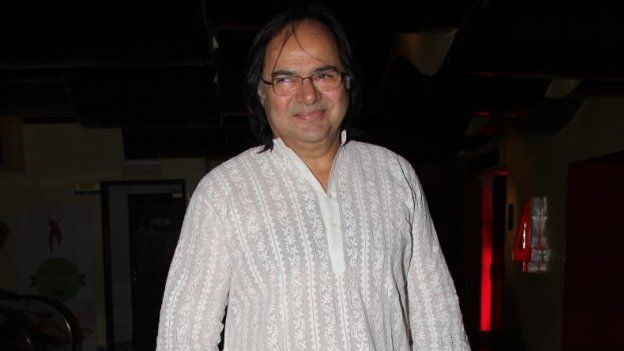Farooq Sheikh: 'A natural actor'
- Published

Farooq Sheikh will be remembered for his effortless acting and gentle nature
Veteran Bollywood actor Farooq Sheikh died of a cardiac arrest in Dubai on Saturday. The BBC Monitoring's Vikas Pandey looks back at the actor's celebrated career.
Farooq Sheikh had a style of his own - humble yet assertive, straightforward but polite and his warmth both on and off screen was hard to miss.
He was not very active in films in the past few years but the news about his sudden death has shocked his fans and colleagues.
The actor died of a cardiac arrest in Dubai on Saturday, leaving the world of Indian cinema and theatre in a state of sadness.
Many describe Sheikh as a suave artist who had equal command over theatre and films.
But he will be most remembered for his roles in realistic films of the 1970s and 80s.
Cult film
Born on 25 March 1948, Sheikh started his career in 1973 with the political film Garam Hawa (Hot Air).
The film dealt with problems of a Muslim family affected by India's partition in 1947. He played the role of a young student in the classic drama and established himself as a natural actor.
Chashme Buddoor (Far be the evil eye) was released in 1981 and soon became a cult film of the charming actor's career.
He played the role of a college student with perfection and his natural style immediately touched a chord with audiences.
His pairing with fellow actress Deepti Naval went on to become one of the most memorable in Indian cinema.
They acted together in eight more films including the 2012 release Listen Amaya.
The actress was heartbroken after hearing about her co-actor's sudden demise.
Farooq Sheikh in Club 60, his last film
"I am known for Chashme Buddoor. Our pairing was great and we acted in eight more films later on," she said, adding that Sheikh was a "natural and very sensible actor".
Farooq saab, as he was popularly known among his friends, made a niche for himself in the 70s when Bollywood was awash with films based on violence and legendary actor Amitabh Bachchan was slowly crafting his on-screen image of an "angry young man".
He quietly occupied a space for himself in the world of cinema and went on to act in realistic films like Katha (Story), Umrao Jan (Story of a courtesan), Saath Saath (Togetherness) and Gaman (Departure).
These films cemented his image as an actor who portrayed complicated characters with ease and made them look simple and real on screen.
Shabana Azmi, who acted with Sheikh in films and theatre, said she has lost a dear friend and and an exemplary colleague.
"I am heartbroken. Our friendship goes back to college. We started in theatre together - our relations go a long way back. It's very difficult for me to talk about Farooq in the past tense," Azmi told Times Now channe, externall as her grieving voice choked several times during the interview.
Memorable
The actor was equally celebrated in the world of theatre for his elegance on stage.
His play Tumhari Amrita (Yours Amrita) has been popular since its inception in 1992 by playwright Javed Siddiqui.
The story revolves around love letters written by the characters to each other in the play.
Azmi and Sheikh were the lead pair of the play and and left their fans spellbound every time they came on stage together in the past two decades.
Sheikh was also active on TV and gave a memorable performance in the Hindi adaption of the British comedy Yes Minister.
His acting achievements aside, Sheikh will be remembered for his humble nature and his unbiased opinions on matters which affected the country and the world.
In the past few years, he appeared frequently on TV debates on the country's political issues and became popular for his frank opinions.
"God! Farooq Sheikh passes away. A true gentleman, a wonderful colleague. A quiet honesty about him. Very very sad," this tweet from Amitabh Bachchan sums up the mood of Farooq's fans across the country.
BBC Monitoring, external reports and analyses news from TV, radio, web and print media around the world. For more reports from BBC Monitoring, click here. You can follow BBC Monitoring on Twitter , externaland Facebook, external.